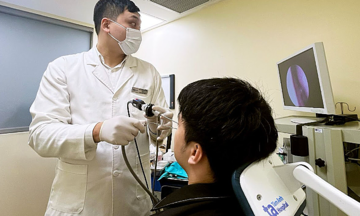"I'm 45 years old, and I treat stroke patients every day. In the end, I also got this disease," Dr. Li Yi recently posted on Douyin.
The MRI results Dr. Yi shared showed he suffered a lacunar stroke, caused by blockages in the small arteries that supply blood to deep brain structures. Fortunately, Dr. Yi's stroke was asymptomatic and didn't require treatment. However, it serves as a warning sign for future strokes if risk factors aren't managed.
Dr. Yi believes his overwork and frequent late nights are the primary causes of his condition. This reflects a worrying trend of work pressure in the Chinese medical industry. A 2020 survey of 4,032 Chinese doctors revealed that 25% suffered from cardiovascular disease, almost 50% had high blood pressure, and doctors over 40 were twice as likely to have these conditions compared to the general population. The high workload and prolonged overwork have led to some medical staff collapsing and even dying on the job.
 |
Illustration of a person suffering a stroke. Photo: *iStock* |
People with pre-existing conditions like high blood pressure, diabetes, cerebrovascular disease, and blood clotting disorders are at high risk for lacunar strokes. These factors increase the likelihood of abnormal blood clots or damage to the inner lining of brain arteries, leading to strokes.
Other risk factors include smoking, excessive alcohol consumption, obesity, lack of exercise, high cholesterol, and frequent stress and anxiety. These can lead to strokes even in younger individuals.
Experts recommend a multi-pronged approach to stroke prevention. Dietary changes such as reducing salt, fat, and sugar intake can help manage blood pressure, cholesterol, and blood sugar – three key risk factors.
Regular physical activity plays a crucial role in maintaining a healthy weight and improving blood circulation. Combined with regular health check-ups every 6–12 months, early detection of abnormalities allows for timely intervention.
For those with underlying conditions like hypertension or diabetes, strict adherence to prescribed treatment plans is crucial to minimize the risk of serious cerebrovascular complications.
Huang Dung (*Sina*)












